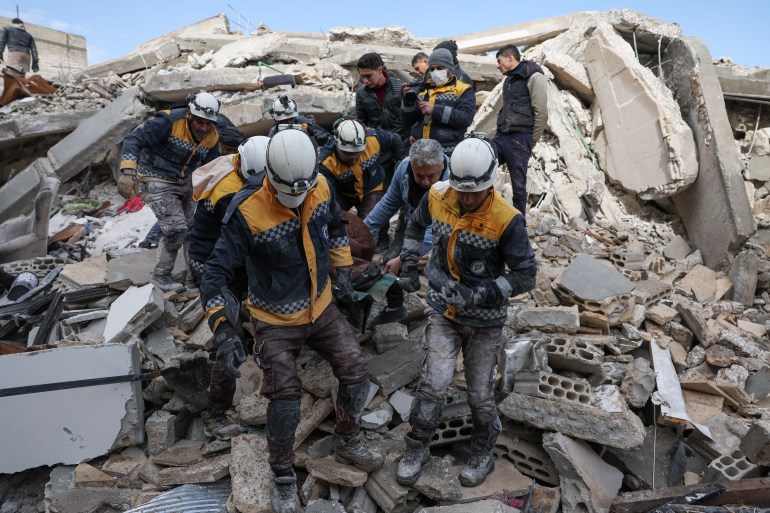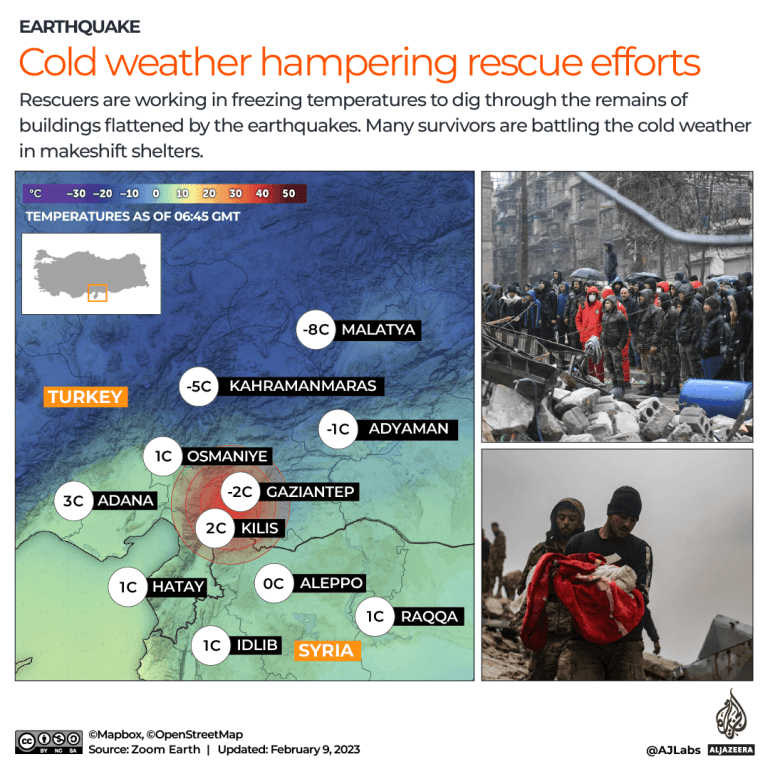Freezing and starving
Turkey-Syria earthquake victims struggle to survive as poor weather conditions hinder rescue and relief efforts.
The sound of hurrying hands and heavy equipment working to find signs of life continues more than six days since two major earthquakes struck the southeastern region of Turkey along the border with Syria on February 6.
In battle-bruised, rebel-held Idlib, the earthquakes flattened numerous buildings, trapping residents under debris and exposing them to freezing temperatures.
Oussama al-Hussein, a coordinator with a healthcare NGO working in the area, told Al Jazeera that rescuers can hear voices under the rubble, but without proper equipment and international assistance, the White Helmets and other local rescue teams are struggling to rescue people.
On Tuesday, four members of a family were rescued from a collapsed building. In a video released by the White Helmets, the crowd can be heard cheering as each child was pulled out alive.
These hopeful moments punctuate the many silent searches which have ended in the recovery of a body. With each hour that passes, hopes for further rescues are diminishing.
Delays in international aid and assistance due to closed borders and roads destroyed by the tremors have compounded the challenges.
People are completely destroyed from inside, first by the years of war and now by this. They are desperate and hopeless. We need medications, all kind of ready-to-eat food, hygiene kits.

Surviving freezing conditions
Rescuers are racing against time, working in the snow, rain and freezing temperatures, dipping to minus 8 degrees Celsius (18 degrees Fahrenheit), to dig through the remains of buildings flattened by the earthquakes.
More bad weather is expected to hit the region, further hampering rescue and relief operations. Collapsed buildings and destroyed roads have also made it difficult to locate survivors and get crucial aid into affected areas. Several airports have also been closed after being damaged by the earthquakes.

We are safe as much as a tent can protect us. The children are cold at night, I have a three-year-old son, he is scared as soon as the tent shakes, and runs towards me asking, is it happening again?
The first earthquake’s epicentre, about 33 kilometres (20 miles) from the city of Gaziantep, a major city and provincial capital in southeastern Turkey, is home to millions of Syrian refugees living in southern Turkey. Thousands of residents have been left without shelter in freezing temperatures.
Mouaz Haj Bakri, a Syrian living in the United States, said he has lost about 40 family members in the earthquakes. Most of them were displaced and living in the city of Antakya in Turkey’s Hatay province, which has been almost entirely destroyed.
The city is unliveable. Those who are still there either cannot leave or are only staying to find their loved ones. People are sleeping outside their destroyed houses, making a fire at night with a ring of people around it, because they are waiting to dig out the bodies. They want to bury their dead.
“My cousins who are still alive can see the feet of their [deceased] nieces and their brothers and sisters but they are unable to remove them from under the rubble,” said Mouaz. “It has been a challenge to ask the Turkish authorities for rescuers and resources to remove the bodies. My family has been doing that themselves. One cousin was removing the rubble with his hands. No one else helped them. This has been the story of many Syrians [in Antakya].”
The situation in Syria, he said, is even worse.
“People in north Syria are cold, hungry and defeated,” Mouaz said, “We are talking about displaced people who already lost their homes once and have been made homeless again. People are going to die from the cold, and no one is going to count them among the earthquake [casualties]. People will die from hunger, and no one will count them. They need so much help.”
How many people have been affected?
The World Health Organization has warned that more than 23 million people could be affected by the massive earthquakes which have devastated Turkey and Syria.